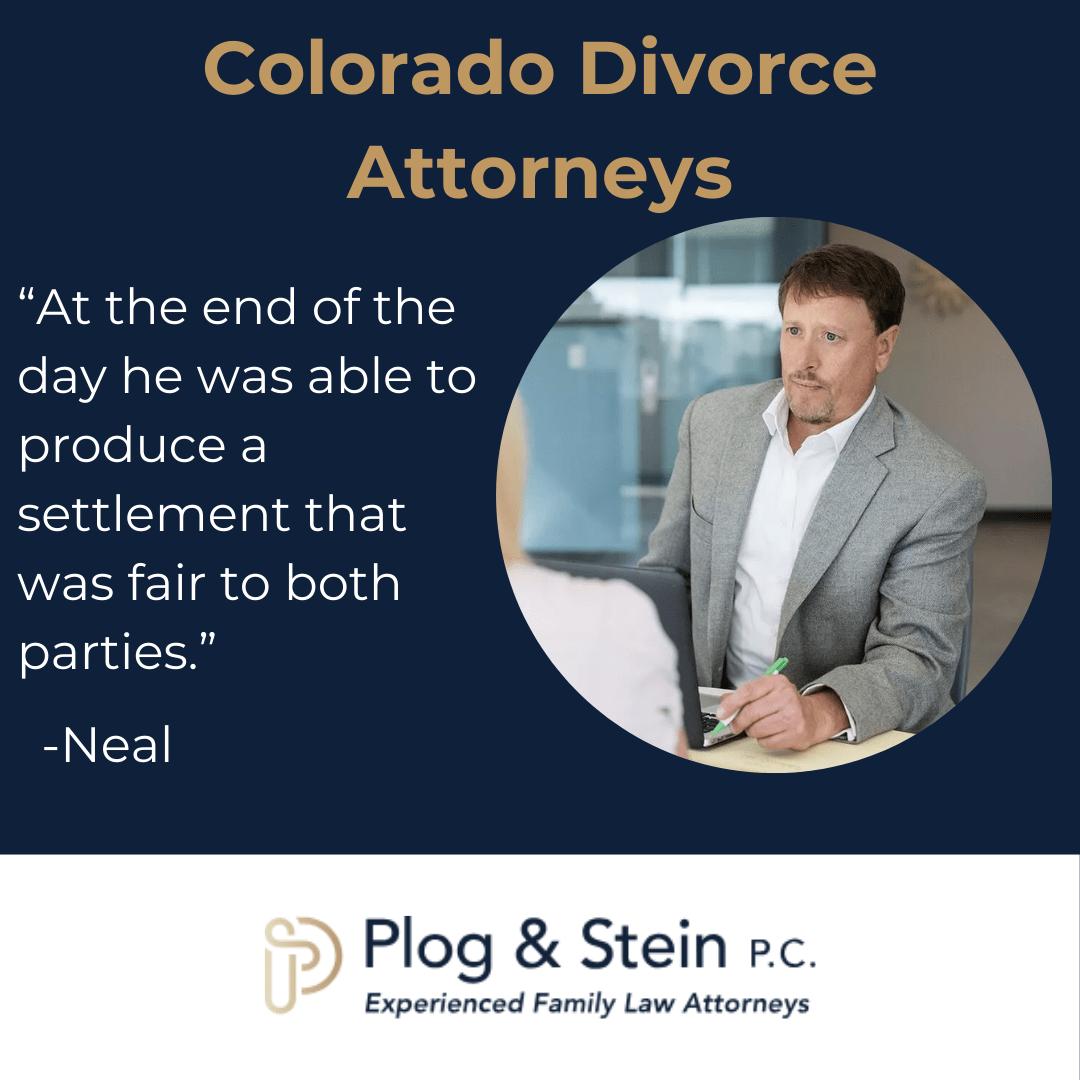General Steps in Divorce Process

Navigating the divorce process in Colorado involves several steps, including filing for divorce, attempting to reach agreements, and attending court hearings. The process can vary based on factors such as whether there are children involved or if the divorce is contested. Seeking guidance from experienced attorneys, like those at Plog & Stein, can help ensure your interests are protected throughout the process.
The general steps in the Colorado divorce process may vary slightly, depending on the circumstances of the spouses who are getting divorced.
When a couple has been married for a short time, and there are no kids or debts, the divorce will likely be quicker than a divorce after a couple has been married for a lengthy time, has accumulated property together, and has minor children.
Facing divorce? Divorce can be emotional. Let our compassionate Denver attorneys help you navigate the legal complexities and protect your future. GET HELP HERE
When a couple can agree about most aspects of the divorce, such as how to divide property and with whom the kids will live, the divorce is also likely to be simpler.
However, there are many acrimonious relationships that make it much more complicated and stressful to get a divorce in Colorado.
At Plog & Stein, P.C., our Denver divorce lawyers aim to take some of the stress out of this process, providing professional and zealous advocacy to help you protect the interests of your family and you.
Key Takeaways for the Colorado Divorce Process:
- Mandatory Waiting Period: Colorado requires a 91-day waiting period from the date of filing before a divorce can be finalized, regardless of whether the case is contested or uncontested.
- Financial Disclosures Are Essential: Both spouses must exchange comprehensive financial information, including assets, debts, income, and expenses, within 42 days after the divorce petition is served.
- Mediation is Often Required: Most divorce cases in Colorado require at least one mediation session to encourage settlement before proceeding to a trial.
- Temporary Orders May Be Necessary: Temporary orders can address financial support, child custody, and parenting time while the divorce is ongoing. These orders provide interim stability and are not binding for the final decree.
- Legal Representation Can Simplify the Process: Working with an experienced Colorado divorce attorney, like those at Plog & Stein, ensures your rights are protected and helps navigate the complexities of contested issues or court hearings.
Table of Contents
- Key Takeaways for the Colorado Divorce Process:
- General Steps in the Colorado Divorce Process
- Unsure About the Next Steps in Your Divorce? Contact Us Today
- Divorce With Children
- What Happens During a Dissolution of Marriage in Colorado
- Get Help Navigating the Divorce Process in Colorado
General Steps in the Colorado Divorce Process
Step 1: File for Divorce
The first step in the divorce process is filing for divorce.
Colorado is a state in which you must state that the marriage is irretrievably broken in order to get a divorce. Fault is not included in your initial petition.
In order to file, your spouse or you must be domiciled in Colorado for a minimum of 91 days.
In some cases, it may be easy to streamline the divorce process and procedures. However, many couples are unable to agree on one or more aspects of the divorce, including child custody, child support, alimony, or property division.
Step 2: Come to An Agreement if Possible
When you agree with your spouse about every issue, you can draft a settlement agreement expressing the terms on which you agree. The spouses may file a joint petition.
The divorce may become final in 91 days, which is the statutorily prescribed waiting period. More often, however, a divorce takes longer. In most contested cases, the process will take several months from start to finish.
Often, one spouse files the divorce petition and serves it on their spouse, and then that spouse has 21 days to file a written response.
Within 42 days, the spouses and their legal representatives attend an initial status conference with the court.
Sometimes this is with a judge and sometimes with a “family court facilitator,” depending on the county the case rests in. At the conference, the court will set important dates and wade through the relevant issues.
If the ISC is in front of a judge or magistrate, the court might also be willing to hear requests for emergency relief or temporary orders, such as related to child and spousal support.
If not, most courts will allow the setting of a formal temporary orders hearing, to take place at a later date.
Step 3: Disclose Financial Information
Both spouses are also supposed to exchange financial information during the 42-day period after the petition for divorce is served.
The initial disclosures include information about income, assets (retirements, bank accounts, real estate, etc.), debts, and monthly expenses.
Step 4: Temporary Orders Hearing
Once disclosures are made and the status conference is held, there might be temporary orders hearing.
Temporary orders may be needed to provide a measure of financial security to one of the spouses or to establish a custody and visitation routine while the divorce case is pending.
Temporary orders end when final orders are entered and are not “prejudicial” to either spouse when it comes time to litigate those final, permanent orders.
Step 5: Discovery
In some cases, the spouses serve discovery in the form of written requests for documents and other information. Discovery requests may include interrogatories, which are questions answered under oath.
Discovery might be issued for purposes of gaining more information from the other party and can be both financial or child-related. This information can then be used for either assessing settlement or preparation for trial.
Step 6: Mediation
In most cases, the court will require the parties to engage in good faith settlement discussions and to attend at least one round of mediation. The hope is that agreements can be reached and court intervention can be avoided.
Step 7: Permanent Orders Hearing and Entering the Decree of Dissolution of Marriage
However, not all parties are able to ultimately agree on the issues, and a settlement cannot always be reached.
When couples still disagree on certain terms, the next step is a hearing for permanent orders, meaning a trial to the court. Trials may be extremely complex and taxing, both emotionally and financially.
At a trial, the judge hears evidence from both spouses and has the power to make a decision for them as relates to both financial and child custody issues.
At the conclusion of the permanent orders hearing, a decree of dissolution of marriage and substantive orders will be entered.
Having an attorney experienced in both trial practice and preparation can make the difference when it comes time to resolve your Colorado divorce case.
Speak with an Attorney Today by Calling (303) 781-0322
Unsure About the Next Steps in Your Divorce? Contact Us Today
Start Your Case Evaluation Here
Divorce With Children
Often, the most emotionally charged and stressful parts of a divorce with kids are related to figuring out child custody, child support, and other issues involving your children.
At Plog & Stein, P.C., our legal team can meticulously analyze your case and help you figure out your next steps.
Our goal is to find solutions that safeguard your interests and the future of your children in the short and the long term.
We can fight aggressively for you in any litigation that may be needed or help you reach an advantageous settlement agreement.

The Complexities of a Divorce with Kids
In the late 1990s, the term “custody” was replaced in Colorado with the term “allocation of parental responsibilities.” This area addresses two major issues: parenting time and decision-making.
Parenting time refers to how much time the child will spend with each parent, including day-to-day visitation schedules, pick-up and drop-off arrangements, and holidays, special events, and vacations.
Decision-making, on the other hand, addresses how major decisions such as the child’s medical care, education, religion, and extracurricular activities are made.
The court can allocate decision-making powers jointly to both parents or solely to one parent. This determination is made depending on the specifics of the case.
All child custody and access disputes are to be resolved in the best interest of the child.
Making a determination based on the best interest of the child allows the judge to examine any factor that may be relevant to the child’s overall health, safety, and well-being, such as:
- The child’s relationship with each parent
- The physical and mental capability of each parent
- The living situation of each parent
- Each parent’s income and earning expenses
- The child’s preferences
- The child’s medical, educational, and other needs
- The child’s adjustment to his or her current school, home, and community.
The list above is not exhaustive. Stability, consistency, and adherence to a routine are powerful concerns when it comes to determining what is in the best interest of the child.
As a result, the judge will also examine any evidence of a party’s conduct that may be detrimental to a child, such as substance abuse, domestic violence, neglect, abandonment, or an inability or unwillingness to provide medical care for the child.
In some cases, when the spouses are getting a divorce, one spouse will move to a different state. This can further complicate custody determinations.
The Uniform Child Custody Jurisdiction and Enforcement Act outlines the rules and guidelines to which Colorado courts must adhere when faced with interstate custody disputes. Our lawyers understand how to handle these complexities.
Unfortunately, sometimes emergencies arise when one parent threatens to leave the state with the children, or leaves with them before any custody arrangement is determined.
In these cases, emergency relief may be available either to prevent the children from being moved out of Colorado or to get them back. These are highly stressful situations, and we will handle them as efficiently and aggressively as possible.
Child support is another issue that frequently comes up when spouses are going through a divorce with kids. Child support determinations in Colorado are generally based on a statutory formula.
While it may seem straightforward initially, the formula can become confusing when a parent has an unconventional employment situation, is underemployed, or is unemployed.
We can evaluate your situation and help you determine the child support obligation that may exist in your case.
It is important to note that child support obligations typically end when a child turns 19, although there are some limited exceptions to this rule.
What Happens During a Dissolution of Marriage in Colorado
Divorce is the most common legal mechanism by which two people formally, and legally, end their marriage. Divorce cases, termed “dissolution of marriage” under Colorado statute, are heard at the district court level.
A divorce case is commenced via the filing of a Petition for Dissolution of Marriage, a Summons (unless filed jointly), and a Case Information Sheet. When filing for divorce, there will be a roughly $200 filing fee, which is paid to the court at the time of filing. For persons unable to afford the filing fee, a motion to proceed with the filing fee being waived may be filed.
The end result of a divorce case is the dissolution, or termination, of the marriage. When the marriage is dissolved, the court will enter a Decree, which is a one or two-page document indicating that the marriage is officially ended.
Colorado is a “no-fault” divorce state, meaning that there do not need to be specific grounds for the divorce other than stating that the marriage is “irretrievably broken with no chance of reconciliation.”
To obtain a divorce in Colorado, one of the spouses must have been domiciled in the state for at least 91 days prior to the filing. Once the other party has been served or has jointly signed off on the Petition for Dissolution of Marriage as a co-petitioner, there is a 91-day waiting period. The decree of dissolution cannot be entered until that 91-day period has passed.
In a divorce case, there are several issues that will need to be resolved as part of the process. The primary issues include:
- Division of Marital Property
- Division of Marital Debt
- Maintenance (Alimony)
In cases in which there are minor children of the marriage, additional issues will also need to be resolved, specifically:
- Child Custody (Allocation of Parental Responsibilities)
- Child Support
The substantive issues in need of resolution will ultimately either need to be agreed upon by the parties, with those agreements being set forth in a written document, generally called a “separation agreement,” or they will be resolved by the court after an evidentiary hearing.
If the parties agree on some issues, but not all, they can file written agreements regarding the matters they agree upon and still proceed to a court trial for the judge or magistrate to rule on the issues they do not.
When the parties agree upon all issues, the case is deemed to be “uncontested.” When there are issues the parties cannot resolve on their own, the case is deemed to be “contested.”
The general sequence or process of a divorce case will be the filing, followed by an initial status conference, which is required to take place within 42 days of the case being filed. The initial status conference will either take place in front of a judge or magistrate, or more often in front of a Family Court Facilitator.
The primary purpose of the initial status conference is for the court to make an assessment of what the contested issues are, what financial or other disclosures need to be made, whether there is a need for financial or child-related experts, and how long the parties believe they need before the case can be set for a final or “permanent orders” hearing.
As courts want people to attempt to resolve their contested issues, most people with a divorce case in the Denver area will be required to attend at least one session of mediation prior to their final hearing.
If there are temporary issues to be resolved while the divorce case is pending, either party may also ask for a “temporary orders” hearing at which issues of temporary child custody, parenting time, child support, spousal support, and use of property can be determined.
As part of the divorce process, even if the case is uncontested, the parties will be required to exchange comprehensive financial disclosures related to income, assets, debts, and expenses.
The duty to provide these documents is mandatory and cannot be waived. If more information is needed by either party, formal discovery can also be issued.
In divorce cases which have contested issues, the time from start to finish will generally be somewhere between 5 months and 8 months, though each case is different and the process may take longer in some counties than others.
People can file for divorce on their own or with the help from a lawyer. Having an attorney can help ensure that your interests are represented, that you are treated fairly, and that you get an appropriate resolution, whether through settlement or a final divorce hearing.
Once the divorce is done, the court still retains jurisdiction to enforce its orders. The court also retains continuing jurisdiction over issues related to child support and child custody, as well as spousal maintenance in most cases in which maintenance is ordered.
Each case is different and some can be quite complex. Regardless of the complexities parties might face, the rules and general process for divorce in Denver is going to be the same.
Get Help Navigating the Divorce Process in Colorado
If you want to know more about general steps in the divorce process, call us.
At Plog & Stein, our family law attorneys in Denver are understanding of our clients’ needs and provide dedicated advocacy to protect their interests during and after a divorce. We have competitive retainer rates.
Contact Plog & Stein at (303) 781-0322 or via our online form for an appointment.
We also represent people who need an alimony lawyer or guidance in other family law matters in Aurora, Centennial, Highlands Ranch, and Castle Rock, as well as other areas of Denver, Douglas, and Arapahoe Counties.









